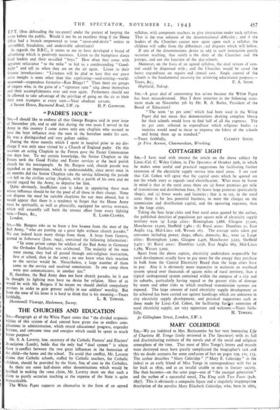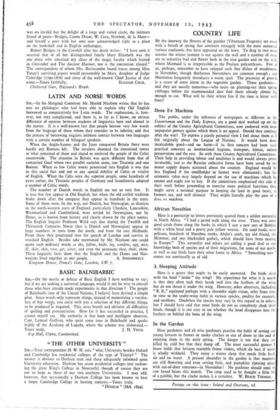MARY COLERIDGE SIR,—We are indebted to Mrs. Battiscombe for her
very interesting Life of Charlotte M. Yonge (lately reviewed in The Spectator) with its full and discriminating estimate of the novels and of the social and religious atmosphere of the time. That most of Miss Yonge's letters and records were destroyed must have greatly complicated the biographer's task and this no doubt accounts for some confusion of fact on pages tog, 110, 133. The author describes " Mary Coleridge" (" Mary E. Coleridge" in the index) as an early friend of Miss Yonge in correspondence with her as far back as 1850, and as an invalid unable to mix in literary society. She then becomes—on the same page—one of " the younger generation" and the author of a successful novel, The King with Two Faces (pub. 1897). This is obviously a composite figure and a singularly inappropriate description of the novelist Mary Elizabeth Coleridge, who, born in 1861„
was no invalid but the delight of a large and varied circle, the intimate friend of poets—Bridges, Canon Dixon, W. Cory, Newbolt, de la Mare— and herself a poet with her own now acknowledged right to a place on the bookshelf and in English anthologies.
Robert Bridges in the Cornhill after her death writes: " I have seen it asserted that of all her distinguished family Mary Elizabeth was the one alone who inherited any share of the magic faculty which fruited in Christabel and The Ancient Mariner, nor is the contention absurd." The correspondent of whom Mrs. Battiscombe found traces among Miss Yonge's surviving papers would presumably be Mary, daughter of Judge Coleridge (179o-1876) and sister of the well-known Chief Justice of that name.—Yours faithfully, ELEANOR CECIL. Chelwood Gate, Hayward's Heath.



























 Previous page
Previous page